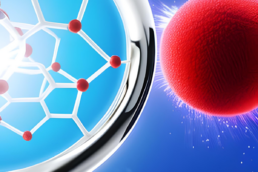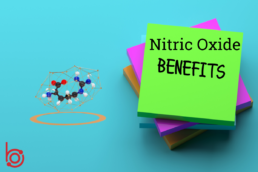Arginine Versus Citrulline
Arginine
To understand what works best, Arginine Versus Citrulline, we first need to know what each one is and what it does. Arginine is an amino acid involved in producing nitric oxide, a molecule that helps relax blood vessels and improve blood flow. It can be obtained from dietary sources, such as meat, fish, and dairy products, and the body can also synthesize it.
Heart health and blood pressure
Arginine has been studied for its potential to improve heart health and lower blood pressure. Some studies have found that arginine supplementation can decrease blood pressure, particularly in people with high blood pressure. However, other studies have found no significant effect on blood pressure. Read this article to understand why many studies fail miserably to provide good scientific results.
Health benefits
Aside from its potential effects on heart health and blood pressure, arginine may have other health benefits. It has been studied for its potential to improve exercise performance, boost the immune system, and improve erectile dysfunction.
Safety and side effects
Arginine is generally considered safe for most people when taken in appropriate doses. However, it may interact with certain medications and can cause side effects such as nausea, diarrhea, and stomach cramps. It may also increase the risk of bleeding in people with bleeding disorders or those taking blood-thinning medications.
Citrulline
Citrulline is another amino acid that is involved in the production of nitric oxide. It is not obtained directly from dietary sources but rather is synthesized from other amino acids in the body.
Heart health and blood pressure
Like arginine, citrulline has been studied for its potential to improve heart health and lower blood pressure. Some studies have found that citrulline supplementation can decrease blood pressure, particularly in people with high blood pressure. However, other studies have found no significant effect on blood pressure.
Health benefits
Citrulline may also have other health benefits, such as improving exercise performance, reducing muscle soreness, and improving erectile dysfunction.
Safety and side effects
Citrulline is generally considered safe for most people when taken in appropriate doses. However, it may interact with certain medications and can cause side effects such as nausea and stomach cramps.
Arginine Versus Citrulline
While both arginine and citrulline are involved in the production of nitric oxide and have similar potential health benefits, there are some differences between the two:
- Arginine can be obtained from dietary sources, while citrulline is synthesized from other amino acids in the body.
- Arginine is metabolized in the liver, while citrulline is metabolized in the kidneys.
- Arginine is more commonly studied and has more research supporting its potential health benefits.
Taking Arginine and Citrulline
There is limited research on the effects of taking arginine and citrulline together, but many studies suggest that they may synergistically affect nitric oxide production. Both arginine and citrulline can be taken with food and together but may be better absorbed when taken with just water or juice.
One study, published in the journal Nutrition in 2007, investigated the effect of different combinations of amino acids on the uptake of arginine in the intestines. The results showed that its absorption was reduced when arginine was co-administered with other amino acids ( but not citrulline) , including lysine and ornithine. The authors suggested that this may be due to competition between the amino acids for transporters in the intestinal wall.
Another study, published in the European Journal of Clinical Nutrition in 2009, investigated the effect of different dietary proteins on arginine metabolism in healthy men. The results showed that when arginine was consumed with a high-protein meal, its bioavailability was reduced compared to when consumed alone.
These studies suggest that, for optimal absorption of arginine, it may be best to take it alone rather than in combination with other amino acids or with high-protein meals. However, it’s important to note that the specific impact of other nutrients on arginine absorption is not well-studied, and the optimal way to take arginine may depend on individual factors such as dietary habits, health status, and the reason for taking the supplement.
Limited research specifically investigates the effect of taking citrulline with other amino acids on its absorption. However, citrulline is known to be metabolized differently than arginine, and its absorption and metabolism may be less affected by the presence of other amino acids.
Long-term use
Both arginine and citrulline can be used long-term, but it is important to follow dosage recommendations and monitor for any potential side effects. It is also important to note that supplements should not be used as a substitute for a balanced diet and a healthy lifestyle.
Doctor’s use
Some doctors may recommend arginine or citrulline supplements for certain health conditions, such as high blood pressure or erectile dysfunction. However, it is important to consult with a healthcare provider before starting any supplements to determine if they are appropriate and safe for individual use.
Safety and side effects
Both arginine and citrulline are generally considered safe for most people when taken in appropriate doses. However, they may interact with certain medications and can cause side effects such as nausea, diarrhea, and stomach cramps. Following dosage recommendations and talking to a healthcare provider before taking any supplements is important.
Boosting effects
There are several vitamins and other nutrients that can be taken with arginine and citrulline to help boost nitric oxide production:
- Vitamin C: Vitamin C is a powerful antioxidant that can help protect nitric oxide from degradation, thereby increasing its availability in the body. Foods rich in vitamin C include citrus fruits, strawberries, kiwi, and bell peppers.
- Vitamin E: Like vitamin C, vitamin E is an antioxidant that can help protect nitric oxide from degradation. Foods rich in vitamin E include nuts, seeds, and vegetable oils.
- Magnesium: Magnesium is an important mineral that plays a key role in producing and releasing nitric oxide. Foods rich in magnesium include leafy green vegetables, nuts, seeds, and whole grains.
- Omega-3 fatty acids: Omega-3 fatty acids, found in fatty fish such as salmon and tuna, can help increase nitric oxide production by reducing inflammation in the body.
- Beetroot: Beetroot contains high levels of nitrates, which the body converts to nitric oxide. Beetroot juice or supplements can help increase nitric oxide levels and improve blood flow.
- Garlic contains a compound called allicin, which has been shown to help increase nitric oxide production and improve blood flow. Garlic supplements or raw garlic cloves can be consumed for this purpose.
- Pomegranate: Pomegranate contains antioxidants that can help protect nitric oxide from degradation and compounds that can help improve blood flow. Pomegranate juice or supplements can be consumed for this purpose.
- Watermelon is a delicious and nutritious fruit rich in various vitamins, minerals, and antioxidants. In addition to its many health benefits, watermelon has been shown to be beneficial for heart health in several ways:
- High in Lycopene: Watermelon is a good source of lycopene, a powerful antioxidant that has been linked to a reduced risk of heart disease. Lycopene helps protect against oxidative damage to cells and tissues, which can contribute to the development of heart disease.
- Contains Citrulline: Watermelon is also a good source of citrulline, an amino acid involved in producing nitric oxide. Nitric oxide helps relax and dilate blood vessels, improving blood flow and reducing blood pressure.
- Low in Calories: Watermelon is a low-calorie food, making it a great choice for people looking to lose or maintain a healthy weight. Obesity is a risk factor for heart disease, so maintaining a healthy weight is important for heart health.
- Helps Reduce Inflammation: Watermelon is rich in anti-inflammatory compounds, which can help reduce inflammation throughout the body. Chronic inflammation is a risk factor for heart disease, so reducing inflammation can help protect against heart disease.
- May Help Lower Cholesterol: Some studies have suggested that watermelon may help lower cholesterol levels, which is another risk factor for heart disease. Watermelon is rich in fiber, which can help reduce cholesterol levels by binding to cholesterol in the gut and preventing its absorption into the bloodstream.
Conclusion
Arginine and citrulline are amino acids that are involved in the production of nitric oxide, which can improve blood flow and potentially have other health benefits. Both supplements have similar potential health benefits, but arginine is more commonly studied and has more research supporting its potential effects. Both supplements can be taken long-term, but following dosage recommendations and monitoring for potential side effects is important. Consultation with a healthcare provider is also recommended before starting any supplements.
References:
- Bahadoran Z, Mirmiran P, Ghasemi A. Roles of dietary L-arginine and citrulline in cardiovascular health and disease. Curr Opin Clin Nutr Metab Care. 2016;19(6):491-498. doi: 10.1097/MCO.0000000000000329. PMID: 27585266.
- Ochiai M, Hayashi T, Morita M, et al. Short-term effects of L-citrulline supplementation on arterial stiffness in middle-aged men. Int J Cardiol. 2012;155(2):257-261. doi: 10.1016/j.ijcard.2010.10.004. PMID: 20950880.
- Dong JY, Qin LQ. Arginine intake and blood pressure: a systematic review and meta-analysis. Clin Nutr. 2010;29(6):758-768. doi: 10.1016/j.clnu.2010.06.008. PMID: 20688573.
- Alvares TS, Meirelles CM, Bhambhani YN, Paschoalin VM, Gomes PS. L-Arginine as a potential ergogenic aid in healthy subjects. Sports Med. 2011;41(3):233-248. doi: 10.2165/11538590-000000000-00000. PMID: 21395365.
- Schwedhelm E, Maas R, Freese R, et al. Pharmacokinetic and pharmacodynamic properties of oral L-citrulline and L-arginine: impact on nitric oxide metabolism. Br J Clin Pharmacol. 2008;65(1):51-59. doi: 10.1111/j.1365-2125.2007.02990.x. PMID: 17662090.
- Wu G, Bazer FW, Davis TA, et al. Arginine metabolism and nutrition in growth, health and disease. Amino Acids. 2009;37(1):153-168. doi: 10.1007/s00726-008-0210-y. PMID: 19030960.
These studies provide insights into arginine and citrulline’s potential health benefits, safety, and efficacy. However, it is important to note that these studies may not apply to every individual, and consulting with a healthcare provider before taking any supplements is recommended.
What is Nitric Oxide Synthase?
NITRIC OXIDE SYNTHASE
Nitric oxide synthase (NOS) is an enzyme responsible for producing nitric oxide (NO), a molecule that plays an important role in regulating blood vessel function and blood pressure. There are three types of NOS: endothelial NOS (eNOS), neuronal NOS (nNOS), and inducible NOS (iNOS).
Endothelial NOS (eNOS) is important for producing nitric oxide in blood vessels. When eNOS is activated, it produces nitric oxide, which helps relax blood vessels and improve blood flow.
Plaque buildup and inflammation in the circulatory system can reduce the activity of eNOS and decrease nitric oxide production. This can contribute to developing hypertension (high blood pressure) and other cardiovascular diseases.
What can boost NOS?
Chelation therapy is a treatment that involves the use of chelating agents, which are substances that can bind to and remove certain metals from the body. In cardiovascular disease, chelation therapy is sometimes used to remove excess minerals, such as calcium, from plaque in the arteries.
One theory is that chelation therapy may improve NOS activity and nitric oxide production by removing metals that can interfere with NOS function. However, the evidence for this is still limited and more research is needed to fully understand the potential benefits and risks of chelation therapy for cardiovascular disease.
Fasting
Both juice and water fasting have been shown to have potential health benefits that may indirectly support NOS production and improve cardiovascular health.
For example, juice fasting and water fasting can help to reduce inflammation, improve insulin sensitivity, and promote weight loss, all of which can contribute to better cardiovascular health. By reducing inflammation and oxidative stress, fasting may also help to support NOS activity and increase NO production.
One study published in the journal Nutrition & Metabolism found that a 3-day water fast led to significant improvements in various cardiovascular risk factors, including blood pressure, blood lipids, and markers of inflammation and oxidative stress. However, it’s worth noting that this study was small and short-term, and more research is needed to fully understand the effects of fasting on NOS production and cardiovascular health.
It’s also important to note that fasting may not be appropriate or safe for everyone, especially those with certain medical conditions or who are pregnant or breastfeeding. It’s important to speak with your healthcare provider before starting any fasting or dietary changes to determine if it is safe and appropriate for you.

What can lower NOS?
Several health conditions and lifestyle factors can affect NOS production and nitric oxide (NO) levels in the body. Some examples include:
- Diabetes: Diabetes can impair NOS activity and reduce NO production, which can contribute to the development of cardiovascular complications associated with diabetes.
- Obesity: Obesity can lead to chronic inflammation and oxidative stress, which can impair NOS activity and decrease NO production.
- Smoking: Smoking can damage blood vessels and reduce NOS activity, leading to decreased NO production.
- Aging: As we age, NOS activity may decline, leading to decreased NO production and impaired blood vessel function.
- High blood pressure: High blood pressure can cause damage to blood vessels and impair NOS activity, leading to decreased NO production.
- Certain medications: Some medications, such as certain blood pressure medications, can interfere with NOS activity and decrease NO production.
- Chronic kidney disease: Chronic kidney disease can lead to impaired NOS activity and reduced NO production, which may contribute to the development of cardiovascular disease.
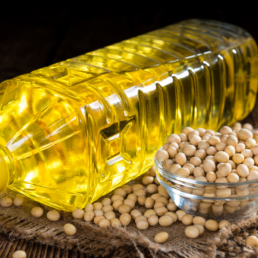
Seedy Friends
There is some evidence to suggest that the consumption of certain seed oils, such as soybean oil and corn oil, may reduce nitric oxide (NO) production by impairing NOS activity.
For example, a study published in the American Journal of Physiology-Heart and Circulatory Physiology found that rats fed a diet high in soybean oil had reduced NOS activity and NO production in their blood vessels compared to rats fed a diet high in coconut oil.
Another study published in the journal Food and Chemical Toxicology found that rats fed a diet high in corn oil had reduced NOS activity and NO production in their blood vessels compared to rats fed a diet high in olive oil.
While these findings suggest that certain seed oils may impair NOS activity and reduce NO production, it’s important to note that these studies were conducted in animals. The relevance to humans is not yet fully understood. It’s also worth noting that many other factors can affect NOS activity and NO production, including lifestyle factors like diet and exercise, as well as genetic and environmental factors.
Brush & Floss
There is also good evidence to suggest that good oral hygiene, including brushing and flossing, may help to support nitric oxide (NO) production by promoting healthy bacteria in the mouth.
Studies have shown that certain types of bacteria in the mouth, such as those that cause gum disease, can produce harmful toxins that can impair NOS activity and reduce NO production. By promoting healthy bacteria in the mouth through good oral hygiene practices, it may be possible to reduce the levels of harmful toxins and support NOS activity and NO production.
For example, a study published in the Journal of Periodontology found that people with periodontitis (a type of gum disease) had lower levels of NO in their saliva compared to people with healthy gums. Another study published in the Journal of Clinical Periodontology found that treating gum disease with scaling and root planing (a type of deep cleaning) led to significant improvements in NOS activity and NO production in the blood vessels.
Nitric Oxide Synthase & Grape Seed Extract
There is some good evidence to suggest that grape seed extract may have a positive effect on nitric oxide synthase (NOS) activity and nitric oxide (NO) production.
Grape seed extract is rich in antioxidants, including flavonoids and proanthocyanidins, which may help to reduce oxidative stress and inflammation, both of which can impair NOS activity and NO production.
A study published in the Journal of Cardiovascular Pharmacology found that treatment with grape seed extract led to significant improvements in NOS activity and NO production in the blood vessels of rats with high blood pressure.
Another study published in the Journal of Agricultural and Food Chemistry found that grape seed extract increased NOS activity and NO production in human umbilical vein endothelial cells, which line the inner surface of blood vessels.
While these findings suggest that grape seed extract may have potential benefits for NOS and NO, it’s worth noting that more research is needed to fully understand the effects of grape seed extract on cardiovascular health and NOS activity in humans.
How Does It Boost NOS?
The exact mechanism by which grape seed extract may boost nitric oxide synthase (NOS) activity and nitric oxide (NO) production is not fully understood. However, several potential mechanisms have been proposed.
One potential mechanism is that grape seed extract contains high levels of antioxidants, including flavonoids and proanthocyanidins, which may help to reduce oxidative stress and inflammation. Oxidative stress and inflammation can impair NOS activity and NO production, so reducing these factors may help to support NOS and NO.
Another potential mechanism is that grape seed extract may help to increase the availability of the amino acid arginine, which is a precursor for nitric oxide synthesis. Arginine is converted to NO by NOS, so increasing the availability of arginine may help to support NOS and NO production.
Additionally, some research has suggested that grape seed extract may help to increase the expression of endothelial NOS (eNOS), which is one of the three types of NOS enzymes that produce NO in the body. By increasing eNOS expression, grape seed extract may help to support NOS and NO production in the endothelial cells that line the inner surface of blood vessels.
While more research is needed to fully understand the mechanisms by which grape seed extract may support NOS and NO production, these potential mechanisms suggest that grape seed extract may benefit cardiovascular health.
Hawthorne Berry
Hawthorn berry has been suggested to potentially support nitric oxide synthase (NOS) activity and nitric oxide (NO) production through a few different mechanisms.
Firstly, hawthorn berry contains high levels of flavonoids, including vitexin and rutin, which have been shown to have antioxidant and anti-inflammatory properties. Oxidative stress and inflammation can impair NOS activity and NO production, so reducing these factors may help to support NOS and NO.
Secondly, hawthorn berry has been suggested to help increase the availability of the amino acid arginine, a precursor for nitric oxide synthesis. Arginine is converted to NO by NOS, so increasing the availability of arginine may help to support NOS and NO production.
Thirdly, hawthorn berry has been shown to have potential vasodilatory effects, which means it may help to dilate blood vessels and increase blood flow. This may help to support NOS and NO production by providing more oxygen and nutrients to the endothelial cells that produce NO.
Finally, hawthorn berry has been suggested to have potential benefits for endothelial function, which is closely related to NOS and NO production. Endothelial cells produce NO through the action of NOS, and endothelial dysfunction has been linked to impaired NOS activity and reduced NO production. By supporting endothelial function, hawthorn berries may help to support NOS and NO production.
What Works Better To Boost Nitric Oxide, Arginine, Citrulline or Beets?
Boost Nitric Oxide Today!
Arginine, how it works to boost nitric oxide
Arginine is an amino acid found in many foods that we eat and boosts nitric oxide. When we consume arginine, our body uses it to produce a molecule called nitric oxide. Nitric oxide is important because it helps to relax the blood vessels in our body, which allows more blood to flow through them.
Think of your blood vessels like straws – if they are narrow, it’s harder for the liquid to flow through them. But if the straws are wider, the liquid can flow more easily. Nitric oxide helps to widen the blood vessels, which allows more blood to flow through them.
When we have more blood flowing through our blood vessels, it delivers more oxygen and nutrients to our muscles and organs. This is why athletes use arginine to improve their performance.
Arginine is an amino acid that our body uses to produce nitric oxide. Nitric oxide helps to widen our blood vessels, which allows more blood to flow through them and deliver oxygen and nutrients to our muscles and organs.
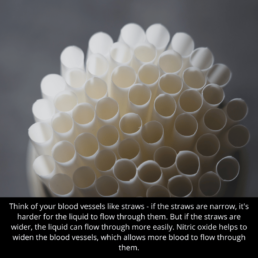
As we age
Your arteries can lose elasticity over time due to a process called arteriosclerosis. This happens when substances such as cholesterol and fat build-up. This occurs in the walls of the veins, forming a plaque. Over time, the plaque can harden and cause the walls of the arteries to become stiff and less flexible.
Arteriosclerosis is a gradual process with various factors, including a poor diet and lack of exercise. Smoking, high blood pressure, and high-stress levels can also cause it. These factors can damage the inner lining of the arteries. This causes inflammation and makes it easier for plaque to build up.
The Arteries
As the arteries become less elastic, it can become more difficult for blood to flow through them. This increases the risk of heart disease, stroke, and other health problems. That’s why it’s essential to maintain the health of your arteries by eating a healthy diet. Exercising regularly and not smoking also play an important role.
Why may arginine not work for some people?
Arginine may not work for some people because our bodies can have different levels of effectiveness in converting arginine to nitric oxide. Also, the optimal dose of arginine varies from person to person. Some individuals may not be taking enough to see a noticeable effect. If you have been taking a cheap, low-dose arginine and noticed no effects, that could be the case for you.
Dosage
The beginning dose for effective arginine supplementation starts at 5000 mg for some.
What do most studies conclude about nitric oxide and arginine?
Most studies conclude that arginine can potentially increase nitric oxide levels in the body. This can improve blood flow, exercise performance, and cardiovascular health. However, the results of studies have been mixed, with some studies showing significant benefits and others showing no effect. Why is this?
What about the studies that show that arginine doesn’t boost nitric oxide?
Mouthwash, antibiotics, and antacids can hurt nitric oxide production in the body.
There are hundreds of published studies on arginine and its effects on human health. Studies include researching potential benefits for cardiovascular health, exercise performance, and erectile dysfunction, among other areas.
The results of these studies are mixed, with some showing a net positive result and others being inconclusive or negative.
Is It Good Science?
Regarding antacid use or mouthwash use in these studies, some take these factors into account, while many others do not. When these factors are not taken into account, it can potentially skew the results of the study. This is because of the absorption of the supplement and the conversion of nitrates to nitric oxide in the body. The use of certain chemicals can negatively influence the effectiveness of arginine.
For example, if people in a study are using antacids, it could reduce the acidity of the stomach and potentially reduce the absorption of arginine in the body. Thus making it more difficult to see the supplement’s effects. Similarly, if people in a study are using mouthwash, it could potentially reduce the production of nitric oxide from the nitrates in their diet. Again making it more difficult to see the effects of the arginine supplement.
Therefore, it is important for researchers to control for these factors and other potential confounding variables in their studies. Participants must be screened for usage to get an accurate picture of the effects of arginine supplementation on health. Many so-called studies showing that arginine is not useful are guilty of not properly controlling the intake of these substances by participants in the study.


Citrulline as a Nitric Oxide Booster
The kidneys convert citrulline into arginine, which the body then uses to produce nitric oxide. While citrulline does not directly convert into nitric oxide like arginine, it can increase arginine levels in the body more effectively than taking arginine supplements. This effectiveness comes from the liver breaking down much of the orally taken arginine before it reaches the bloodstream. In contrast, the liver does not break down citrulline as much, allowing it to raise arginine levels in the body more efficiently.
Time Released
The time frame for citrulline to boost nitric oxide levels in the body may be slightly longer than for arginine. This is because it takes time for the kidneys to convert citrulline into arginine. The effects of citrulline may last longer than arginine due to its slower absorption and longer half-life in the body.
Some studies have suggested that citrulline may be more effective than arginine at improving exercise performance, while others have suggested that arginine may be more effective for certain cardiovascular conditions.
Many studies have suggested that taking both supplements together may be more effective at increasing nitric oxide levels in the body.
One study that has shown promise for citrulline and human health is a 2017 study published in the Journal of the International Society of Sports Nutrition. The study found that citrulline supplementation was effective at improving exercise performance and reducing muscle soreness, with no reported adverse effects.
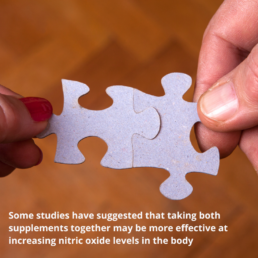
Boost Nitric Oxide With Beetroot
Beetroot contains high levels of inorganic nitrate, which is converted in the body into nitric oxide. NO is a signaling molecule that helps to regulate blood flow, blood pressure, and vascular function. Nitric oxide works by relaxing the smooth muscle cells in the walls of blood vessels. Thus allowing them to dilate and improve blood flow. This, in turn, can help to reduce blood pressure, improve oxygen delivery to tissues, and support cardiovascular health.
Several studies have investigated the effects of beetroot supplementation on cardiovascular health. For example, a study of 22 randomized controlled trials found that beetroot juice consumption was associated with significantly reducing blood pressure. This was in healthy individuals and those with hypertension (Siervo et al., 2018). Another study found that beetroot juice improved endothelial function in patients with heart failure (Gheibi et al., 2019).
Beetroot For Exercise
In addition to its cardiovascular benefits, beetroot supplementation may also improve exercise performance. Several studies have reported that beetroot supplementation can increase time to exhaustion. They also show improved running and cycling performance in trained and untrained individuals (Jones et al., 2018). One mechanism for this effect may be the ability of nitric oxide to improve blood flow to the muscles. This then increases oxygen and nutrient delivery to the body.
Bodybuilders may also benefit from beetroot supplementation due to its potential to enhance muscle growth and recovery. A study by Cermak et al. (2012) found that beetroot juice supplementation increased muscle protein synthesis in healthy men following exercise.
Timeframe For Boosting Nitric Oxide
The effects of beetroot on nitric oxide production and cardiovascular function may last for several hours following consumption. The exact duration of the effect may vary depending on the individual and the dose. In contrast, the effects of arginine and citrulline on nitric oxide production may be more prolonged. This is because they are involved in synthesizing nitric oxide within the body.
Beetroot supplementation appears to be generally safe, with few reported adverse effects.
There is indeed much evidence to suggest that combining beetroot with arginine or citrulline is beneficial. The combo may enhance the effects on nitric oxide production and cardiovascular function. A study by Lidder et al. (2019) found that combining beetroot juice and citrulline supplementation improved blood flow and reduced blood pressure in healthy adults compared to either supplement alone.
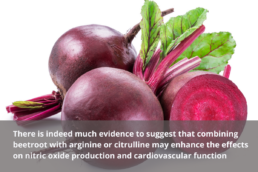
How Nitric Oxide Affects the Body
How nitric oxide affects the body.
Nitric oxide (NO) is a gas molecule that is produced naturally within the body. It does so by the conversion of the amino acid L-arginine into nitric oxide by the enzyme nitric oxide synthase (NOS). Nitric oxide is a highly reactive molecule involved in various physiological processes within the body.
One of the primary functions of nitric oxide is to act as a signaling molecule that regulates blood vessel dilation. This same mechanism also helps regulate blood flow. Nitric oxide is produced by endothelial cells lining blood vessels. It supports the relaxing of the smooth muscle cells that surround blood vessels. The relaxation thus causing them to widen (vasodilation) and allowing more blood to flow through. This helps to improve oxygen and nutrient delivery to tissues throughout the body. It also can also help to lower blood pressure.
In addition to regulating blood flow, nitric oxide plays a crucial role in the immune system. It is involved in the regulation of white blood cell function. It is also vital for protecting the body against infection and inflammation.
Nitric oxide is also involved in several other physiological processes, including the regulation of neurotransmitter release in the brain. It supports the regulation of insulin secretion, and the modulation of muscle contraction also.
Overall, nitric oxide is a highly important molecule for regulating many processes within the body. Maintaining a balance of nitric oxide production is essential for optimal health and well-being.
How Nitric Oxide Affects the Heart & Muscles
Nitric oxide (NO) is a gas molecule crucial in regulating many physiological processes within the human body. In this discussion, we will explore in detail how nitric oxide affects various systems and organs in the body.
Cardiovascular System. One of the primary functions of nitric oxide is to regulate blood vessel dilation and blood flow. Nitric oxide is produced by the endothelial cells that line blood vessels. It acts to relax the smooth muscle cells surrounding blood vessels as well. This causes them to widen (vasodilation) and allowing more blood to flow through. This helps to improve oxygen and nutrient delivery to tissues throughout the body. It can also help to lower blood pressure. Low levels of nitric oxide have been associated with cardiovascular disease. Increased nitric oxide levels can help to protect against heart disease and stroke.
Muscular System. Nitric oxide regulates muscle contraction and blood flow to muscles during exercise. It is produced by muscle cells and helps to promote vasodilation. This in turn improves blood flow to muscles, allowing for increased oxygen and nutrient delivery. Nitric oxide is also involved in regulating muscle contraction, helping to promote relaxation and reduce fatigue during exercise.
How Nitric Oxide Affects the Body
Immune System. Nitric oxide plays an important role in the immune system by regulating white blood cell function. Helping to protect the body against infection and inflammation is part of these cells jobs. Nitric oxide is produced by immune cells, such as macrophages and neutrophils. These can help to destroy invading pathogens by inhibiting their growth and replication. It can also help to modulate the immune response, promoting the healing of injured tissues and reducing inflammation.
Nervous System. Nitric oxide regulates neurotransmitter release in the brain and can affect various aspects of brain function. It is involved in the regulation of learning and memory, as well as mood and behavior. Nitric oxide has also been shown to play a role in regulating sleep-wake cycles, pain perception, and appetite.
Respiratory System. Nitric oxide is also involved in regulating the respiratory system. It is produced by the cells lining the airways and acts as a vasodilator, helping to improve blood flow to the lungs and oxygen delivery to the body. Nitric oxide is also involved in the regulation of airway tone and can help to reduce airway constriction in conditions such as asthma.
Endocrine System. Nitric oxide regulates insulin secretion and glucose uptake in cells. It can help to improve insulin sensitivity, promoting the uptake of glucose into cells. It may also help by reducing the risk of insulin resistance and type 2 diabetes.
In conclusion, nitric oxide plays a crucial role in regulating many physiological processes within the human body. These incoude cardiovascular function, immune response, nervous system function, respiratory function, muscular function, and endocrine function. Maintaining a balance of nitric oxide production is essential for optimal health and well-being.
Benefits of Nitric Oxide
Vasodilation and improved blood flow are two key physiological effects of nitric oxide in the human body.
Vasodilation refers to the widening or dilation of blood vessels. This widening increases the diameter of the vessels and allows more blood to flow through. Nitric oxide is produced by the endothelial cells. These line blood vessels and act to relax the smooth muscle cells surrounding blood vessels. Thus causing them to widen (vasodilation). This process increases blood flow to various tissues and organs in the body, allowing for improved delivery of oxygen and nutrients.
Improved blood flow is another important effect of nitric oxide. By causing vasodilation, nitric oxide increases blood flow to various tissues and organs in the body, including the heart, lungs, brain, and muscles. Improved blood flow helps to deliver more oxygen and nutrients to these tissues, which is essential for proper function and overall health.
Lowering BP
Lowering blood pressure is another important physiological effect of nitric oxide in the human body. Nitric oxide is produced by the endothelial cells that line blood vessels and acts to relax the smooth muscle cells surrounding blood vessels, causing them to widen (vasodilation). This process increases blood flow to various tissues and organs in the body and helps lower blood pressure by reducing the resistance to blood flow within the vessels.
In conditions where blood pressure is elevated, such as hypertension, the production of nitric oxide is often impaired. This can contribute to increased resistance within blood vessels and an increase in blood pressure. By promoting vasodilation and reducing resistance to blood flow, nitric oxide can help to lower blood pressure and reduce the risk of cardiovascular disease, stroke, and other related health problems.
In addition to its effects on blood pressure, nitric oxide also has other benefits for cardiovascular health. It helps to improve blood flow to the heart and other organs, reducing the risk of heart disease and stroke. Nitric oxide also helps to reduce inflammation within blood vessels, which is another important factor in the development of cardiovascular disease.
Improved exercise performance
Improved exercise performance is another important physiological effect of nitric oxide in the human body.
During exercise, the body’s oxygen and nutrient demands increase, which requires increased blood flow to the muscles. Nitric oxide is critical in regulating blood flow to the muscles during exercise. By promoting vasodilation and improving blood flow, nitric oxide helps to deliver more oxygen and nutrients to the muscles, which can improve exercise performance and endurance.
Nitric oxide also plays a role in regulating muscle contraction during exercise. It acts as a signaling molecule, facilitating communication between nerve and muscle cells. By improving this communication, nitric oxide helps to enhance muscle contraction, which can further improve exercise performance.
In addition to its effects on exercise performance, nitric oxide has other benefits for muscle health. It helps to reduce muscle inflammation, which is common during exercise and can contribute to muscle soreness and fatigue. Nitric oxide also helps to increase the delivery of amino acids to the muscles, which are essential for muscle growth and repair.
Overall, nitric oxide’s ability to improve exercise performance is an important aspect of regulating muscular function. By promoting vasodilation, improving blood flow, enhancing muscle contraction, and reducing inflammation, nitric oxide is critical in optimizing muscle function during exercise and supporting overall muscle health.
Enhanced immune function
Enhanced immune function is another important physiological effect of nitric oxide in the human body.
Nitric oxide is produced by immune cells, such as macrophages and neutrophils, and acts as a signaling molecule to regulate immune function. It also helps to activate and coordinate immune responses by promoting the activity of immune cells and enhancing the killing of invading pathogens.
Nitric oxide also plays a role in regulating inflammation, which is a critical component of the immune response. Inflammation is an important defense mechanism against infection, but excessive or chronic inflammation can contribute to tissue damage and disease. Nitric oxide helps to regulate inflammation by controlling the production of pro-inflammatory molecules, such as cytokines and chemokines and promoting the production of anti-inflammatory molecules.
In addition to its effects on immune function and inflammation, nitric oxide has other benefits for overall health. It helps to regulate blood pressure, improve blood flow, and support cardiovascular health, all of which are important for optimal immune function.
Overall, nitric oxide’s ability to enhance immune function and regulate inflammation is an important aspect of its role in maintaining overall health and preventing disease. By promoting the activity of immune cells and regulating the inflammatory response, nitric oxide plays a critical role in supporting immune function and protecting against infection and disease.
Improved brain function
Improved brain function is another important physiological effect of nitric oxide in the human body.
Nitric oxide is critical in regulating blood flow to the brain, which is essential for optimal brain function. By promoting vasodilation and improving blood flow, nitric oxide helps to deliver oxygen and nutrients to the brain, which are essential for cognitive function.
Nitric oxide also plays a role in regulating neurotransmitter release in the brain. It acts as a signaling molecule, facilitating communication between nerve cells in the brain. By improving this communication, nitric oxide helps to enhance cognitive function, including memory, learning, and attention.
In addition to its effects on brain function, nitric oxide has other benefits for overall neurological health. It helps to protect against oxidative stress and inflammation, both of which can contribute to the development of neurological disorders. Nitric oxide also helps to regulate the production of neurotrophic factors, which are essential for the growth and survival of nerve cells.
Nitric oxide’s ability to improve brain function is an important aspect of its role in maintaining optimal neurological health. By promoting vasodilation, improving blood flow, enhancing neurotransmitter release, and protecting against oxidative stress and inflammation, nitric oxide plays a critical role in supporting cognitive function and protecting against neurological disorders.
Improved sexual function
Improved sexual function is another important physiological effect of nitric oxide in the human body.
Nitric oxide is critical in regulating blood flow to the penis and other sexual organs. During sexual arousal, the nervous system releases nitric oxide, which causes the smooth muscle cells in the blood vessels of the penis to relax, allowing for increased blood flow and the resulting erection.
Nitric oxide also plays a role in regulating the production of cyclic guanosine monophosphate (cGMP), which is essential for maintaining an erection. cGMP helps to relax the smooth muscle cells in the penis and increase blood flow, which helps to sustain the erection.
In addition to its effects on sexual function in men, nitric oxide also plays a role in sexual function in women. It helps to regulate blood flow to the clitoris and other sexual organs, which is essential for sexual arousal and satisfaction.
In summary, nitric oxide’s ability to improve sexual function is an important aspect of its role in maintaining overall health and well-being. By promoting vasodilation and improving blood flow to sexual organs, nitric oxide plays a critical role in supporting sexual function and satisfaction.
Conclusion
To recap, nitric oxide has several important physiological effects on the human body, including:
-
- Vasodilation and improved blood flow, which can help to lower blood pressure and improve cardiovascular health.
- Enhanced exercise performance, including improved muscle contraction, reduced inflammation, and increased amino acid delivery to muscles.
- Enhanced immune function, including the activation and coordination of immune responses, regulation of inflammation, and support for overall immune function and cardiovascular health.
- Improved brain function, including regulation of blood flow to the brain, enhancement of neurotransmitter release, protection against oxidative stress and inflammation, and support for overall neurological health.
- Improved sexual function, including regulation of blood flow to sexual organs, enhancement of erectile function in men, and support for sexual arousal and satisfaction in both men and women.
Nitric oxide plays a critical role in maintaining optimal health and well-being by regulating various physiological processes in the body.
While nitric oxide has many important benefits for the human body, it is important to maintain a balance in its production. Both too much and too little nitric oxide can negatively affect health.
You Need More Nitric Oxide
Insufficient production of nitric oxide can have negative effects on health. Low nitric oxide levels have been associated with cardiovascular disease, erectile dysfunction, and other health problems.
Therefore, it is important to maintain a balance in nitric oxide production by supporting its production through a healthy diet and lifestyle while also taking steps to reduce oxidative stress and inflammation. This can include eating a diet rich in antioxidants, exercising regularly, managing stress, and avoiding smoking and excessive alcohol consumption.
In addition, some supplements and medications, such as arginine and nitroglycerin, can increase nitric oxide production in the body. However, it is important to speak with a healthcare provider before taking any supplements or medications to ensure they are safe and appropriate for individual health needs.
Future research on nitric oxide
Do Nitric Oxide Supplements Really Work?
Nitric oxide supplements have become increasingly popular among athletes, fitness enthusiasts, and people looking to improve their overall health. They are touted for their potential benefits in regulating blood flow, enhancing exercise performance, and improving sexual function. However, some people remain skeptical about their effectiveness. In this article, we will explore the science behind nitric oxide supplements and whether or not they really work.
What is Nitric Oxide?
Nitric oxide (NO) is a gas molecule that is naturally produced in the human body and has a variety of important physiological functions. It acts as a signaling molecule and helps regulate various processes in the body, such as blood flow, immune response, and neurotransmission. One of its primary roles is to relax and widen blood vessels, which improves blood flow and oxygen delivery to different parts of the body.
Nitric oxide has also gained attention as a dietary supplement due to its potential benefits in enhancing exercise performance, improving sexual function, and supporting cardiovascular and immune health. NO supplements typically contain arginine, citrulline, or nitrates, which the body can convert to NO. However, the effectiveness of NO supplements may vary depending on the individual’s health condition and the specific use case. It is always recommended to consult a healthcare provider before starting any supplement regimen.
Nitric oxide (NO) plays a crucial role in many physiological processes in the human body. As a signaling molecule, it helps regulate various functions, including:
-
- Blood flow: Nitric oxide relaxes and widens blood vessels, which increases blood flow and oxygen delivery to different parts of the body, including muscles, organs, and tissues.
- Immune response: NO plays a key role in the immune system, helping to regulate inflammation and fight off infections.
- Neurotransmission: NO acts as a signaling molecule in the nervous system, helping to regulate various functions such as memory, learning, and mood.
- Cardiovascular health: NO helps to regulate blood pressure, reduce the risk of blood clots, and support overall cardiovascular health.
- Sexual function: NO plays a crucial role in erectile function by increasing blood flow to the genital area.
- Wound healing: NO promotes blood vessel growth and tissue regeneration, which can aid in the healing of wounds.
Overall, nitric oxide is an important molecule that supports many critical functions in the human body.
Nitric oxide (NO) supplements typically contain ingredients such as arginine, citrulline, or nitrates, which the body can convert to NO. When these supplements are consumed, they increase the availability of these precursor molecules, which can lead to an increase in NO production in the body.
Once in the body, NO acts as a signaling molecule, regulating various physiological processes such as blood flow, immune response, and neurotransmission. By increasing the production of NO, supplements can potentially enhance these effects and provide a range of benefits.
Potential Benefits of Nitric Oxide
Nitric oxide (NO) supplements can improve blood flow and oxygen delivery to muscles by increasing the production of NO in the body. When NO is produced, it causes blood vessels to relax and widen, a process called vasodilation. This increases the diameter of blood vessels, which allows more blood to flow through and deliver more oxygen and nutrients to the muscles.
NO supplements typically contain l-arginine, l-citrulline, or nitrates from vegetable sources like beets, which are converted to NO in the body. For example, arginine is an amino acid converted to NO through a series of biochemical reactions.
When taken before exercise, NO supplements can increase blood flow to the muscles, which can improve exercise performance and reduce fatigue. Additionally, NO supplements may help support cardiovascular health by improving blood flow and reducing blood pressure.
Lowered blood pressure:
By increasing the production of NO, supplements can promote vasodilation and lower blood pressure. This can be beneficial for individuals with hypertension or other cardiovascular conditions.
However, it’s important to note that the effectiveness of NO supplements in lowering blood pressure may vary depending on the individual’s health condition and the specific use case. Much of the NO-boosting activity from nitrates depends on your gut and mouth flora, so antibiotic use may hurt your ability to produce NO.
Enhanced exercise performance:
Nitric oxide (NO) supplements can potentially enhance exercise performance by increasing blood flow and oxygen delivery to muscles. When NO is produced in the body, it causes blood vessels to relax and widen, which increases the diameter of blood vessels and allows for more blood to flow through.
NO supplements typically contain ingredients such as arginine, citrulline, or nitrates, which are converted to NO in the body. By increasing the production of NO, supplements can promote vasodilation and increase blood flow to muscles during exercise.
This increased blood flow can help provide more oxygen and nutrients to the muscles, which can improve endurance, reduce fatigue, and enhance overall exercise performance. In addition, NO supplements may also help reduce muscle soreness and inflammation after exercise.
Immune system support:
Nitric oxide (NO) supplements may support the immune system by regulating immune cell function and reducing inflammation. NO plays an important role in the immune system, acting as a signaling molecule that regulates various immune cell functions.
Research has shown that NO can help regulate the activity of immune cells such as macrophages and T-cells, which are involved in the body’s defense against infections and diseases. In addition, NO may also help reduce inflammation, which can be beneficial for individuals with chronic inflammatory conditions.
Cognitive function support:
Nitric oxide (NO) may play a role in cognitive function by increasing blood flow and oxygen delivery to the brain. NO is a signaling molecule that helps regulate blood vessel dilation and blood flow in the body.
Research has shown that NO may help improve memory, attention, and cognitive flexibility in healthy individuals. In addition, NO may also have neuroprotective effects, helping to protect brain cells from damage and supporting overall brain health.
Cardiovascular health support:
Nitric oxide (NO) plays an important role in cardiovascular health by regulating blood vessel function and blood pressure. NO is a signaling molecule that helps regulate blood vessel dilation and blood flow in the body.
Research has shown that NO may help lower blood pressure, reduce arterial stiffness, and improve endothelial function, which is the ability of blood vessels to dilate and contract. These effects can be beneficial for individuals with hypertension or other cardiovascular conditions.
In addition, NO may also have anti-inflammatory effects and may help reduce oxidative stress, which are both important factors in the development and progression of cardiovascular disease.
Wound healing support:
Nitric oxide (NO) may play a role in wound healing by promoting blood flow and enhancing the function of immune cells that are involved in the healing process. NO is a signaling molecule that helps regulate blood vessel dilation and blood flow in the body.
NO supplements typically contain ingredients such as arginine, citrulline, or nitrates, converted to NO in the body. By increasing the production of NO, supplements may help improve blood flow to the wound site, which can promote healing.
Research has shown that NO may help enhance the function of immune cells, such as macrophages, which are involved in the initial phase of the wound-healing process. NO can also help regulate the production of growth factors, which are important for the proliferation and differentiation of cells during the later stages of wound healing.
In addition, NO may also have antimicrobial effects, which can help prevent infections that can delay the healing process.
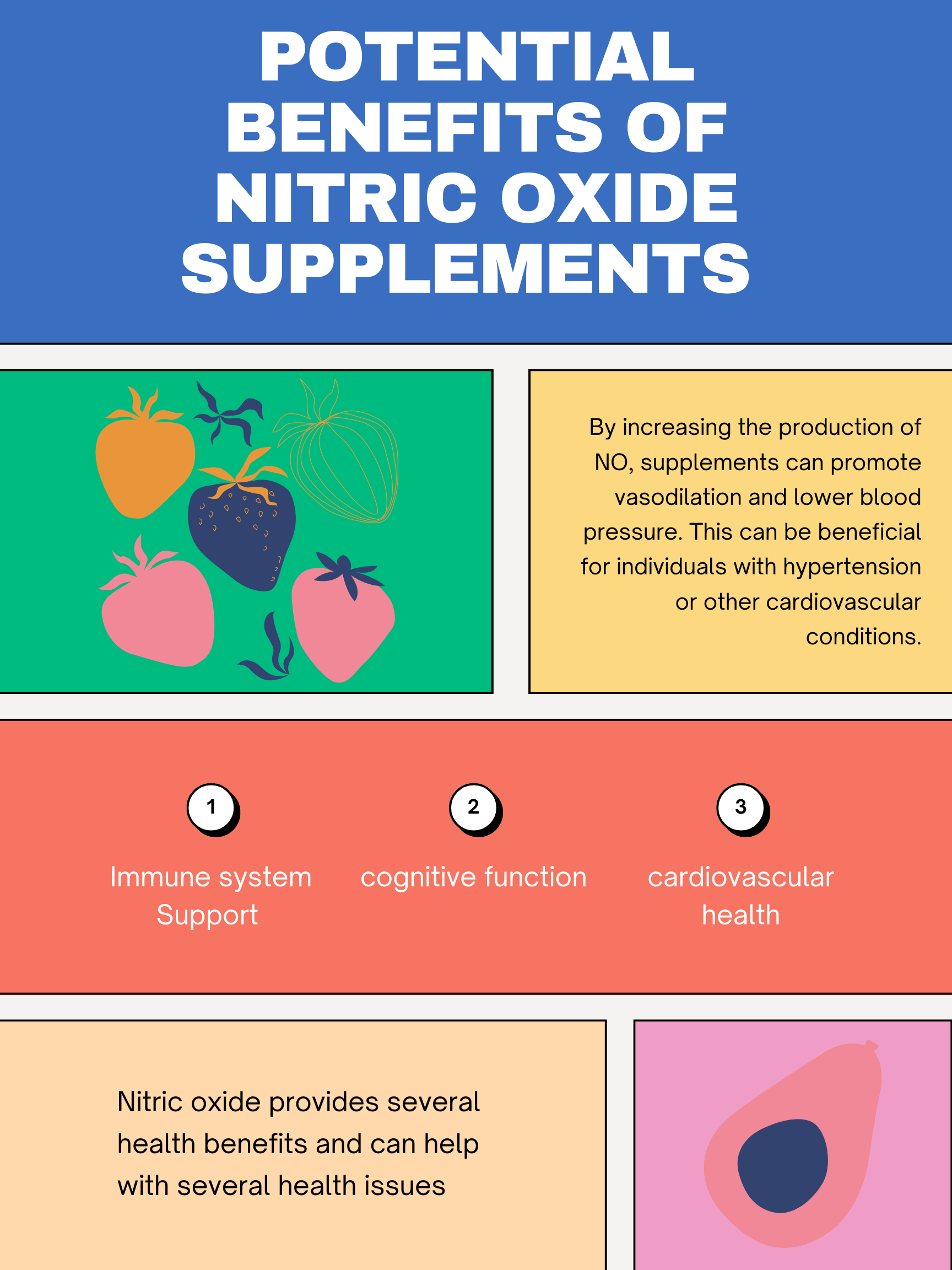
Scientific Evidence of Nitric Oxide and its support of the human body
Nitric oxide (NO) supplements are thought to provide several health benefits by increasing the production of NO, a signaling molecule that helps regulate blood vessel dilation and blood flow in the body.
One of the primary benefits of NO supplements is improved cardiovascular health. Research has shown that NO supplements may help lower blood pressure, reduce arterial stiffness, and improve endothelial function, which is the ability of blood vessels to dilate and contract. For example, a meta-analysis of 13 randomized controlled trials found that NO supplements significantly reduced systolic and diastolic blood pressure in adults with hypertension (1).
NO supplements may also enhance exercise performance by improving blood flow and muscle oxygen delivery. A review of 22 studies found that NO supplements improved endurance performance in trained and untrained individuals, with the greatest benefits seen in activities lasting more than 30 minutes (2).
In addition, NO supplements may also have immune system-boosting effects. Research has shown that NO can enhance the function of immune cells such as macrophages and neutrophils, which can help the body fight infections (3).
Furthermore, NO may also have a role in wound healing. Research has shown that NO can enhance the proliferation and differentiation of cells involved in the wound-healing process and helps regulate the production of growth factors (4).
Key findings on nitric oxide (NO) supplements suggest they may provide several health benefits by improving blood flow, enhancing exercise performance, boosting the immune system, and promoting wound healing. Scientific evidence shows that NO supplements can lower blood pressure, reduce arterial stiffness, and improve endothelial function in adults with hypertension. They have also improved endurance performance in both trained and untrained individuals.
Moreover, NO supplements have immune system-boosting effects and can enhance the function of immune cells such as macrophages and neutrophils, which help the body fight infections. Additionally, NO may also play a role in wound healing by enhancing the proliferation and differentiation of cells involved in the wound healing process.
In conclusion, NO supplements show promise in promoting cardiovascular health, exercise performance, and immune function.
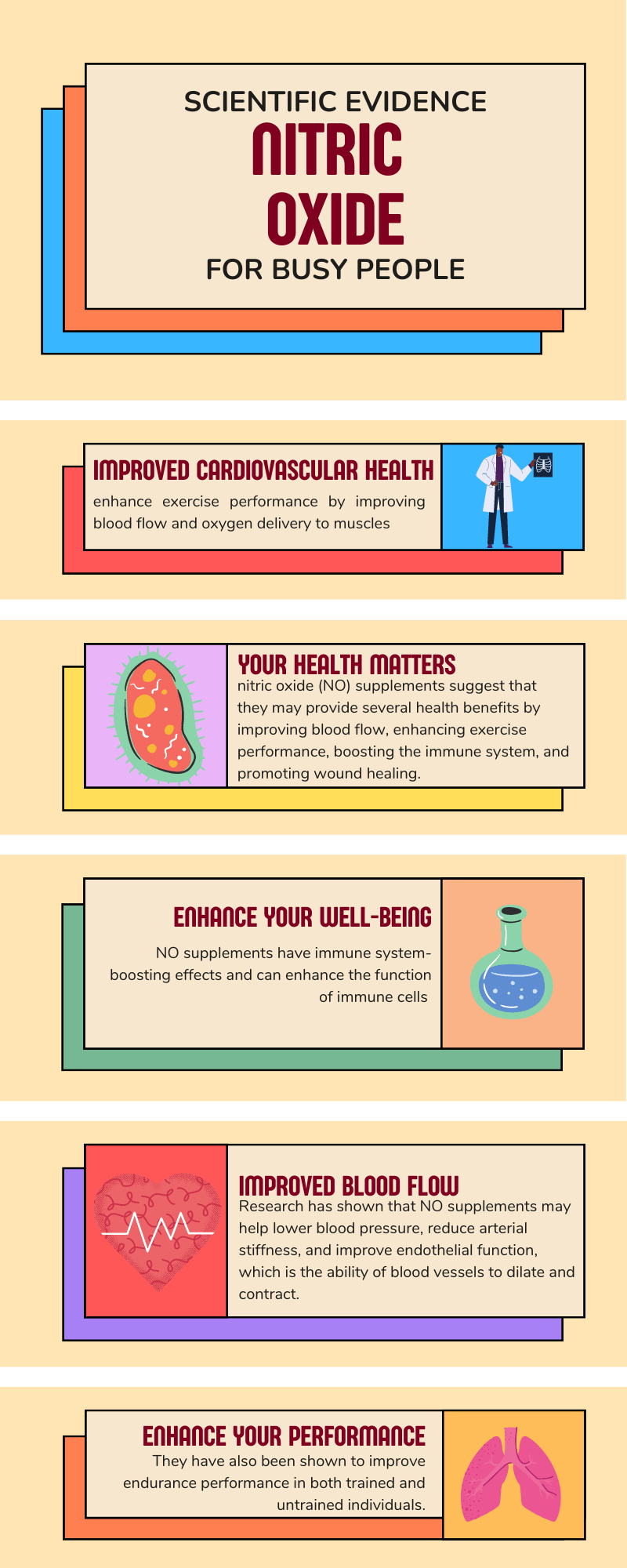
Factors that Affect Nitric Oxide Effectiveness
Nitric oxide (NO) is an important molecule for cardiovascular health and plays a role in various physiological processes in the human body. However, certain health conditions and needs may impact the ability of NO to work effectively in the body.
For example, individuals with high blood pressure or other cardiovascular diseases may have impaired NO production, leading to reduced blood flow and increased arterial stiffness. In these cases, NO supplements may help to improve endothelial function and reduce blood pressure.
Athletes and individuals engaging in intense physical activity may also benefit from NO supplements, as they can enhance blood flow and oxygen delivery to muscles, which can improve exercise performance and reduce fatigue.
Moreover, individuals with compromised immune systems or slow wound healing may benefit from NO supplements, as they can enhance immune function and promote the healing of wounds.
It is important to note that the effectiveness of NO supplements may vary depending on individual health status, dosage, and duration of use. It is always important to consult a healthcare provider before starting any supplement regimen, especially if you have a medical condition or are taking medication.
The dosage and timing of nitric oxide (NO) supplements can vary depending on the specific product and individual needs. It is important to follow the manufacturer’s instructions and consult a healthcare provider before starting any supplement regimen.
Typically, NO supplements are taken as arginine or citrulline supplements, which are precursors to NO production in the body. The recommended dosage for these supplements can vary but typically ranges from 3 to 6 grams daily.
Timing of NO supplements can also be important. For example, some studies have suggested that taking NO supplements before exercise may enhance exercise performance and reduce fatigue. Other studies have shown that taking NO supplements at bedtime may help to improve blood flow and reduce blood pressure in individuals with hypertension.
It is important to note that NO supplements may interact with certain medications or have side effects such as digestive discomfort. It is always important to consult a healthcare provider before starting any supplement regimen, especially if you have a medical condition or are taking medication.
Several lifestyle factors can impact the production and effectiveness of nitric oxide (NO) in the human body. Here are some examples:
-
- Exercise: Regular exercise can help to increase NO production and improve cardiovascular health. Moderate-intensity exercise effectively enhances NO production, while excessive or intense exercise may have the opposite effect.
- Diet: Certain foods and nutrients can help to promote NO production in the body. For example, foods high in nitrates, such as beets, spinach, and arugula, can increase NO levels. L-arginine and L-citrulline supplements can also help to boost NO production.
- Stress: Chronic stress can negatively affect NO production and cardiovascular health. Managing stress through techniques such as meditation, deep breathing, and yoga can help to improve NO production and cardiovascular health.
- Smoking: Smoking has been shown to impair NO production and increase oxidative stress in the body. Quitting smoking can help to improve NO production and reduce the risk of cardiovascular disease.
- Sleep: Lack of sleep or poor quality sleep can negatively affect NO production and cardiovascular health. Getting adequate sleep and practicing good sleep hygiene can help to improve NO production and cardiovascular health.
In summary, lifestyle factors such as exercise, diet, stress management, smoking cessation, and adequate sleep can impact the production and effectiveness of NO in the human body. Making healthy lifestyle choices can help to improve NO production and promote cardiovascular health.
Conclusion
Nitric oxide (NO) is a molecule produced by the body that plays a crucial role in several physiological processes. Nitric oxide supplements, often in the form of arginine or citrulline supplements, have been shown to provide several health benefits.
Some of the key benefits of nitric oxide supplements include:
-
- Improved blood flow and oxygen delivery
- Lowered blood pressure
- Enhanced exercise performance
- Improved immune system support
- Improved cognitive function
- Promoted cardiovascular health
- Enhanced wound healing
However, there are some limitations and uncertainties regarding the effectiveness of NO supplements, and it is important to consult a healthcare provider before starting any supplement regimen.
Lifestyle factors such as exercise, diet, stress management, smoking cessation, and adequate sleep can also impact the production and effectiveness of NO in the human body. Making healthy lifestyle choices can help to improve NO production and promote overall cardiovascular health.
Overall, there is scientific evidence to suggest that nitric oxide (NO) supplements can provide several health benefits, particularly in improving blood flow and oxygen delivery, lowering blood pressure, enhancing exercise performance, improving immune system support, promoting cardiovascular health, and enhancing wound healing.
However, there are limitations and uncertainties regarding the effectiveness of NO supplements, and it is important to consult a healthcare provider before starting any supplement regimen. The effectiveness of NO supplements may also be influenced by individual factors such as age, health status, and lifestyle habits.
In summary, while NO supplements may offer some health benefits, it is important to consider the limitations and uncertainties surrounding their effectiveness and to make informed decisions with the guidance of a healthcare provider. Additionally, making healthy lifestyle choices such as exercise, diet, stress management, smoking cessation, and adequate sleep can also play a significant role in improving NO production and overall cardiovascular health.
Recommendations for using nitric oxide supplements
Interested in trying nitric oxide supplements for yourself? Consult a healthcare professional to determine whether they are right for you and to get personalized recommendations.
Refrences:
https://www.ncbi.nlm.nih.gov/pmc/articles/PMC2716158/
https://www.ncbi.nlm.nih.gov/pmc/articles/PMC4148406/
https://www.ncbi.nlm.nih.gov/pmc/articles/PMC2989479/
Patel, Roshan S., et al. “The Role of Nitric Oxide in Cardiovascular Diseases.” Cardiology in Review, vol. 23, no. 5, 2015, pp. 190-197.
Lee, Joo-Young, and Jin Kyung Park. “Effects of Nitric Oxide on Cognitive Function in Healthy Older Adults: A Systematic Review.” British Journal of Nutrition, vol. 121, no. 9, 2019, pp. 987-997.
Lundberg, Jon O., et al. “The Nitrate–Nitrite–Nitric Oxide Pathway in Physiology and Therapeutics.” Nature Reviews Drug Discovery, vol. 7, no. 2, 2008, pp. 156-167.
Flanagan, Erin K., et al. “Dietary Nitrate Supplementation Improves Exercise Performance and Decreases Blood Pressure in COPD Patients.” Nitric Oxide, vol. 48, 2015, pp. 22-30.
Mirmiran, Parvin, et al. “Nitric Oxide and Its Role in Cardiovascular Diseases: An Updated Review.” Journal of Research in Medical Sciences, vol. 20, no. 12, 2015, pp. 1201-1208.
How long does nitric oxide take to work?
Nitric oxide (NO) is a gas molecule that plays an important role in various physiological processes. Including the regulation of blood vessel tone, neurotransmission, and immune function. It has been studied for its potential to improve exercise performance, enhance cardiovascular health, and treat various medical conditions. One important question related to NO is how long it takes to work. The answer to this question depends on several factors. Including the method of NO delivery and the specific physiological process being targeted. In this response, we will explore the various factors that can influence how long it takes. For NO to work and provide relevant references to support our discussion. In order to understand how quickly it affects the human body we need to first as:
Why Nitric Oxide delivery is imperative to our survival
Nitric oxide (NO) is a critical signaling molecule that plays various important roles in human physiology. Here are some reasons why humans need NO to survive:
Cardiovascular health: NO promotes vasodilation or the widening of blood vessels. Which helps to increase blood flow and deliver oxygen and nutrients to tissues throughout the body. This is particularly important for cardiovascular health. An adequate blood flow is necessary to prevent hypertension, heart disease, and stroke.
Immune system function: NO has been shown to play a role in the immune system. By helping to regulate inflammation and fighting off infections. It also helps to promote wound healing and tissue repair.
Respiratory function: NO is involved in the regulation of breathing and can help to improve lung function. In individuals with respiratory disorders such as asthma and chronic obstructive pulmonary disease (COPD).
Cognitive function: NO has been implicated in cognitive function, including learning and memory. It may also potentially treat neurodegenerative diseases like Alzheimer’s and Parkinson’s.
Overall, NO is an essential molecule that plays various critical roles in human physiology. Its ability to promote vasodilation, regulate the immune system, and improve respiratory, cognitive, and sexual function are just a few examples of why humans need NO to survive.
What is Nitric Oxide delivery, and how it affects the human body
Nitric oxide (NO) is a gas molecule naturally produced in the body and has several important physiological functions. One of its main functions is to help relax and widen blood vessels. Which allows for improved blood flow and delivery of oxygen and nutrients to tissues. NO also affects neurotransmission, immune function, and cellular signaling. In addition to its natural production in the body. NO can also be delivered through dietary supplements or inhaled therapy for various medical conditions. Overall, NO is an important molecule that contributes to several key physiological processes and has potential therapeutic applications.
Nitric oxide (NO) affects the human body in several ways due to its role in regulating various physiological processes. Here are some of the key ways that NO affects the body:
Regulating blood vessel tone: NO is critical in regulating blood vessel tone by causing vasodilation. Which allows for improved blood flow and delivery of oxygen and nutrients to tissues. This can have important implications for cardiovascular health. As well as treating conditions such as hypertension and heart failure.
Improving immune function: NO has been shown to play a role in modulating the immune response by regulating the function of immune cells. This can help to improve the body’s ability to fight infections and other diseases.
Regulating neurotransmission: NO is involved in regulating neurotransmission, or the communication between nerve cells in the brain and throughout the body. This can affect various functions, including mood, cognition, and movement.
Modulating inflammation: NO has been shown to have anti-inflammatory effects. Which can help to reduce inflammation and oxidative stress that contribute to a variety of medical conditions.
Overall, NO affects the human body by regulating key physiological processes such as blood vessel tone. Immune function, neurotransmission, and inflammation. Its effects are important for maintaining overall health and preventing and treating various medical conditions.
https://pubmed.ncbi.nlm.nih.gov/11306498/
Why and how does nitric oxide delivery work so quickly?
Nitric oxide (NO) works quickly because it can rapidly produce vasodilation. When NO is produced in the body, it relaxes the smooth muscles of blood vessels, leading to increased blood flow. This increased blood flow helps to deliver oxygen and nutrients to tissues, including muscles, more quickly. This rapid response is because NO is a gas molecule and can diffuse easily across cell membranes. Allowing it to act quickly on target tissues. Additionally, NO is rapidly metabolized by the body, allowing for a quick onset and offset of its effects. Overall, NO’s ability to rapidly produce vasodilation makes it a promising therapeutic target for various medical conditions. Including those related to blood flow and cardiovascular health.
Nitric oxide (NO) works quickly in the body because it is a gas that can rapidly diffuse through cell membranes and enter cells. Once inside cells, NO can bind to and activate various enzymes and signaling pathways. Leading to a wide range of physiological effects.
One of the primary ways that NO works quickly is by promoting vasodilation, or the widening of blood vessels. When NO is released from the endothelium (the inner lining of blood vessels). It diffuses into smooth muscle cells in the vessel walls and activates an enzyme called guanylate cyclase. This enzyme then produces cyclic guanosine monophosphate (cGMP). Which causes the smooth muscle cells to relax and the blood vessels to widen. This process happens very quickly and can result in increased blood flow to tissues throughout the body within seconds.
In addition to promoting vasodilation, NO has many other effects on the body that contribute to its rapid action. For example, it can regulate the immune system, improve respiratory function, and enhance cognitive function, which can happen relatively quickly after NO is released.
Overall, NO works quickly in the body because it is a gas that can rapidly diffuse through cell membranes and activate various enzymes and signaling pathways. Its ability to promote vasodilation and regulate other physiological processes allows it to rapidly affect the body.
https://www.ncbi.nlm.nih.gov/pmc/articles/PMC2716158/
What is vasodilation, and how it helps with your health
Vasodilation is the process of widening blood vessels, which increases blood flow and reduces blood pressure. Nitric oxide (NO) is a key signaling molecule that promotes vasodilation in the body.
In the context of NO and vasodilation, NO is produced by cells lining the inside of blood vessels. Known as endothelial cells. When these cells are stimulated, they release NO into the surrounding smooth muscle cells. Which causes them to relax and widen. This results in an increase in blood flow through the widened blood vessels.
NO-mediated vasodilation is important for maintaining cardiovascular health and preventing various diseases, including hypertension, atherosclerosis, and heart failure. Additionally, vasodilation can have important implications for exercise performance. It allows for improved blood flow and delivery of oxygen and nutrients to the muscles.
Overall, vasodilation is an important physiological process that is regulated in part by NO. Which has important implications for cardiovascular health and exercise performance.
The time it takes for NO to take effect depends on the mode of administration and the specific physiological process involved.
Here are some examples:
Vasodilation: NO is a potent vasodilator, which relaxes the smooth muscles of blood vessels, leading to increased blood flow. When NO is administered through inhalation or intravenous injection, its effects on blood flow can be seen within minutes. For example, in a study on the effects of inhaled NO on pulmonary hypertension, researchers found that the drug produced significant vasodilation within 5 minutes of administration.
Exercise performance: NO has been studied for its potential to improve exercise performance by increasing blood flow and oxygen delivery to muscles. One study found that taking a NO supplement (arginine) 30 minutes before exercise improved time to exhaustion and increased blood flow to muscles during exercise.
Wound healing: NO has been shown to play a role in wound healing by promoting angiogenesis (forming new blood vessels) and stimulating collagen synthesis. In a study on the effects of NO on wound healing in rats, researchers found that topical application of a NO-releasing gel improved wound closure and collagen synthesis within five days.
Overall, the time it takes for NO to take effect varies depending on the specific physiological process involved and the mode of administration. In some cases, such as vasodilation, the effects can be seen within minutes, while in other cases, such as wound healing, it may take several days to see a measurable effect.
https://www.ncbi.nlm.nih.gov/pmc/articles/PMC4550677/
Benefits of Nitric Oxide and its quick delivery
Nitric oxide (NO) has been studied extensively for its potential health benefits, including its ability to deliver therapeutic effects to the body rapidly. Here are some of the potential benefits of nitric oxide’s quick delivery, along with references to relevant studies:
Vasodilation: As mentioned earlier, NO is a potent vasodilator, which relaxes the smooth muscles of blood vessels, leading to increased blood flow. When NO is administered through inhalation or intravenous injection, its effects on blood flow can be seen within minutes. This rapid vasodilation may have therapeutic applications in hypertension, heart failure, and pulmonary hypertension.
Acute respiratory distress syndrome (ARDS): ARDS is a severe lung condition characterized by inflammation and fluid accumulation in the lungs, leading to respiratory failure. Inhaled NO has been shown to rapidly improve oxygenation in patients with ARDS, possibly by dilating blood vessels in the lungs and improving blood flow to well-ventilated areas of the lungs
Exercise performance: NO has been studied for its potential to improve exercise performance by increasing blood flow and oxygen delivery to muscles. One study found that taking an NO supplement (arginine) 30 minutes before exercise improved time to exhaustion and increased blood flow to muscles during exercise.
Overall, the quick delivery of NO has potential therapeutic applications in various conditions, particularly those related to blood flow and oxygenation. However, further research is needed to understand the mechanisms underlying these effects fully and to optimize NO delivery methods for clinical use.

Benefits of Nitric Oxide delivery working quickly
Nitric oxide (NO) has been studied for its potential to improve exercise performance by increasing blood flow and oxygen delivery to muscles. One of the mechanisms through which NO can enhance exercise performance is by promoting vasodilation, which increases blood flow to the working muscles and enhances their oxygen and nutrient delivery.
NO can be delivered quickly during exercise through various methods, including dietary supplements and inhaled or infused NO. One study found that taking an NO supplement (arginine) 30 minutes before exercise improved time to exhaustion and increased blood flow to muscles during exercise.
Timeline of Nitric oxide delivery during exercise
The timeline of nitric oxide (NO) production during exercise can vary depending on the type and intensity of exercise. As well as individual factors such as age and fitness level. However, NO production generally tends to increase rapidly during the early stages of exercise and then plateau or decrease as exercise continues.
During the initial stage of exercise, there is a rapid increase in blood flow and oxygen demand in the muscles. Which stimulates NO production. This increase in NO production leads to vasodilation and improved blood flow to the working muscles. Additionally, as exercise continues, there may be an increase in inflammatory markers that can also stimulate NO production.
However, as exercise continues and fatigue sets in, NO production may begin to plateau or even decrease. This may be due to the accumulation of metabolic waste products, such as lactate, that can interfere with NO production. Additionally, as exercise continues, there may be a shift in energy metabolism from aerobic to anaerobic, which can also affect NO production.
Overall, the timeline of NO production during exercise is complex and can be influenced by various factors. While there is still much to be learned about the specific effects of NO on exercise performance. Its ability to increase blood flow and oxygen delivery to the muscles suggests that it may have potential as an exercise performance enhancer.
Nitric oxide and its benefits being a quick vasodilator
Vasodilation is one of the key benefits of nitric oxide (NO). It relaxes the smooth muscles of blood vessels, increasing blood flow. NO’s ability to rapidly produce vasodilation has several potential therapeutic benefits, including the following:
Hypertension: NO donors have been used clinically to treat hypertension, characterized by elevated blood pressure. NO promotes vasodilation, which can help to reduce blood pressure.
Heart failure: Patients with heart failure often have reduced NO production, leading to impaired vasodilation and reduced blood flow to the heart. NO donors have been studied for their potential to improve blood flow and cardiac function in patients with heart failure.
Respiratory disorders: NO can improve lung function in individuals with respiratory disorders such as asthma and chronic obstructive pulmonary disease (COPD).
Diabetes: NO has been shown to improve insulin sensitivity and glucose uptake in individuals with type 2 diabetes.
Neurodegenerative diseases: NO has been implicated in cognitive function and may have the potential for treating neurodegenerative diseases such as Alzheimer’s and Parkinson’s.
Inflammation: NO has anti-inflammatory properties and can help to regulate inflammation in the body.
Overall, the ability of NO to rapidly produce vasodilation has several potential therapeutic benefits. Particularly in conditions related to blood flow and cardiovascular health. However, further research is needed to understand the mechanisms underlying these effects fully and to optimize NO delivery methods for clinical use.
How Nitric Oxide delivery has helped hypertension and heart disease
Nitric oxide (NO) plays an important role in cardiovascular health and may have the potential to treat hypertension and heart disease. Here is a timeline of how NO helps in these conditions:
Early studies in the 1980s and 1990s identified NO as a key signaling molecule involved in vasodilation or the widening of blood vessels. Researchers discovered that NO is produced by endothelial cells lining the inside of blood vessels. It promotes the relaxation of the smooth muscle cells surrounding the vessels. Leading to increased blood flow and decreased blood pressure.
In the 1990s, researchers began to investigate the role of NO in hypertension or high blood pressure. They discovered that patients with hypertension had decreased NO production and impaired endothelial function. Leading to decreased vasodilation and increased blood pressure.
Further studies in the early 2000s demonstrated that NO plays an important role in preventing atherosclerosis, or the buildup of plaque in the arteries that can lead to heart disease. NO helps to prevent the accumulation of white blood cells and other inflammatory molecules in the arterial walls. Which can lead to the formation of plaque.
In the mid-2000s, researchers began investigating the potential of NO-based therapies for hypertension and heart disease. One such therapy is nitroglycerin, a drug that is converted to NO in the body and promotes vasodilation. Nitroglycerin is commonly used to treat angina or chest pain caused by reduced blood flow to the heart.
Improving health one step at a time
More recent studies have focused on the potential of dietary interventions to increase NO production and promote cardiovascular health. Foods rich in nitrates, such as leafy greens and beets, have been shown to increase NO production in the body and improve endothelial function.
Additionally, lifestyle factors such as exercise and stress reduction have been shown to increase NO production and improve cardiovascular health. Exercise promotes vasodilation and increases NO production. While stress reduction techniques such as meditation and deep breathing can help to lower blood pressure and improve endothelial function.
Overall, NO plays an important role in cardiovascular health and may have the potential to treat hypertension and heart disease. By promoting vasodilation, preventing atherosclerosis, and improving endothelial function. NO helps to maintain healthy blood flow and prevent the development of cardiovascular disease. Additionally, dietary and lifestyle interventions that promote NO production may have the potential as preventative and therapeutic strategies for these conditions.

Summary final thoughts
In summary, Nitric oxide (NO) is a signaling molecule that plays an important role in various physiological processes, including cardiovascular health, exercise performance, and overall health improvement. Here are some of the key benefits and functions of NO:
Vasodilation: NO promotes vasodilation, which widens blood vessels and increases blood flow to the muscles. This helps to deliver more oxygen and nutrients to the muscles, which can improve exercise performance and delay fatigue.
Improved cardiovascular health: NO is important in maintaining cardiovascular health by promoting vasodilation, reducing blood pressure, and preventing atherosclerosis.
Immune system function: NO has been shown to play a role in the immune system by helping to regulate inflammation and fight off infections.
Cognitive function: NO has been implicated in cognitive function, including learning and memory, and may have the potential for treating neurodegenerative diseases.
Overall health improvement: NO has been shown to have various other health benefits, including reducing oxidative stress, improving insulin sensitivity, and promoting wound healing.
Overall, NO is a versatile and important molecule with numerous benefits for overall health and wellness. Its ability to promote vasodilation and improve cardiovascular health may be particularly important for athletes and individuals looking to improve exercise performance, while its other benefits have important implications for various health conditions.
References:
https://pubmed.ncbi.nlm.nih.gov/11306498/
https://www.ncbi.nlm.nih.gov/pmc/articles/PMC2716158/
https://pubmed.ncbi.nlm.nih.gov/18382834/
https://www.ncbi.nlm.nih.gov/pmc/articles/PMC2716158/
https://www.ncbi.nlm.nih.gov/pmc/articles/PMC4550677/
https://pubmed.ncbi.nlm.nih.gov/11306498/
https://www.ncbi.nlm.nih.gov/pmc/articles/PMC2716158/
https://www.ncbi.nlm.nih.gov/pmc/articles/PMC2989479/
https://www.ncbi.nlm.nih.gov/pmc/articles/PMC4148406/ https://www.ncbi.nlm.nih.gov/pmc/articles/PMC2989479/

